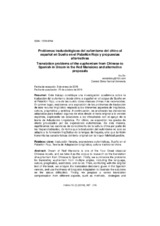Problemas traductológicos del eufemismo del chino al español en Sueño en el Pabellón Rojo y propuestas alternativas
Translation problems of the euphemism from Chinese to Spanish in Dream in the Red Mansions and alternative proposals
Autor
Dai, Xin
Editor
UCOPressFecha
2019Materia
Traducción literariaExpresiones eufemísticas
Sueño en el Pabellón Rojo
Teoría de Adaptación Lingüística
Cultura tradicional china
Literary Translation
Euphemistic Expressions
Dream of Red Mansions
Theory of Linguistic Adaptation
Traditional Chinese Culture
METS:
Mostrar el registro METSPREMIS:
Mostrar el registro PREMISMetadatos
Mostrar el registro completo del ítemResumen
Este trabajo constituye una investigación académica sobre la traducción del eufemismo desde chino a español en el corpus de Sueño en el Pabellón Rojo, una de las cuatro obras clásicas chinas más reconocidas. En primer lugar, realizamos una exposición de los problemas de traducción de este recurso lingüístico respecto a los diferentes aspectos de lingüística, cultura, pragmática y estética. A continuación, se analizarán las decisiones adoptadas para traducir algunos de ellos desde el texto original a la versión española, explicando las soluciones a las dificultades con el apoyo de la teoría de Adaptación Lingüística. Por último, se expondrán los grados de efecto provocados por las expresiones eufemísticas. De esta manera, equilibramos las carencias de conocimiento de la cultura china por parte de los hispanohablantes, de forma que la traducción del eufemismo no solo se adapte a la formación lingüística de la lengua de llegada, sino que también transmita las características del texto original con la mayor fidelidad posible. Dream of Red Mansions is one of the Four Great classical Chinese novels, and we take it as the corpus to research on the translation of euphemism from Chinese to Spanish. Firstly, we summarize the problems for translating euphemism from multiple angles, including the language, culture, pragmatics, aesthetics, and so on. Then, combining with the original text of the book, we analyze the translation decisions given in the Spanish version, and use the theory of Linguistic Adaptation to illustrate the solutions on the above difficulties. Finally, we propose a series translation compensation from different aspects, such as methods,strategies and expression effect. In this way, we can make up the lack of Spanish on the Chinese culture, so that the translation of euphemism could not only be adaptive to the structures of target language, but also convey the characteristics of original novel faithfully.

